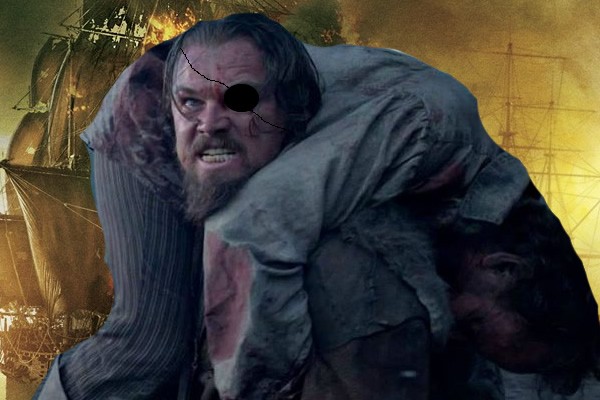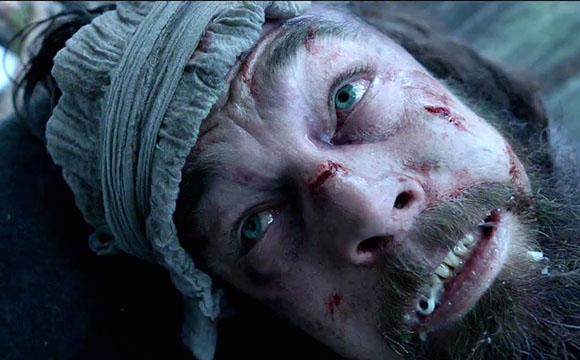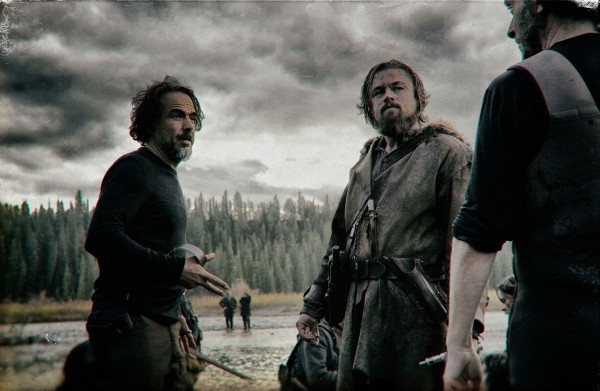(Guten Tag, Flynn Keaton is CHUD’s German perspective)
Alejandro G. Inarritu‘s The Revenant was finally released in Europe this week, which meant I was finally able to watch the adaptation of the source novel I had read last March for CHUD. And you know what – Inarritu has changed a lot of the story. That’s why the credits state it’s only “based in part on the novel”. Wanna know what he changed? Let’s take a look at the biggest differences.
SPOILERS, obviously.
No Native American family.
In the novel, Hugh Glass doesn’t have a Native family. He did have a Caucasian girlfriend once, but she died while he was away on an adventure. I get why Inarritu changed that. It’s an easier explanation why Glass is able to speak with the Natives he meets, and it gives Hardy’s racist character Fitzgerald additional reason to feel less empathy for Glass. In the movie, Fitzgerald is visibly marked by an earlier encounter with Natives, and having a semi-Native among him makes it easier way for his conscience to abandon a man who obviously isn’t as loyal/racist as he is.
The revenge is not about murder, but robbery.
As there’s no family in the novel, Fitzgerald does not kill Glass’s kid, or any other friendly settler. Instead, he just steals Glass’s favorite rifle, an Anstadt Kentucky flintlock, and his beloved knife. Glass later says that he didn’t really mind them leaving him to die out there, but he’s unable to forgive them for taking his gear. There’s certainly no bigger incentive to crawl through hell than for avenging a loved one. It’s understandable that Inarritu went for that concept, and is perfectly fine. The story itself is pretty cold already, and having Glass do all of that just for a rifle would have alienated many viewers. Even if the extreme of that could have made for an even better, less traditional movie.
Less mercy for the boy.
In the novel, Glass beats the shit out of the boy, nearly killing him right in front of the Captain who says that the boy’s fate is up to Glass. Fitzgerald had given Glass’s favorite knife to the boy, and Glass takes it back from him. Glass initially wanted to kill him, but he has a change of heart and doesn’t go through with it. Days later, the highly injured boy apologizes and makes peace with Glass. In the movie, Glass knocks the boy down with a rifle butt, but nothing more. He tells the Captain that it was Fitzgerald’s fault, and that’s it.
Glass doesn’t rescue a Native woman.
In the movie, Glass interferes with a raping of a Native woman by French settlers, enabling her to eventually kill the attacker and flee. Inarritu’s idea. Right, it makes for a thrilling scene, but here’s the problem with that scene: it kinda spoils that DiCaprio’s character is still human, and no longer angrily spiting death just to kill Fitzgerald. The movie later brings back the woman he helped, to tie up Glass’s story, but Inarritu does so in a very clumsy way.
The ending is completely different.
In the movie, Glass locates Fitzgerald in the wilderness, nearly kills him in a bloody fight, then lets a group of Natives (the rescued woman among them) scalp and kill the man. The original showdown is rather less exciting. Upon hearing that Glass is coming for him, Fitzgerald quickly enlists in the US Army. Glass arrives and demands to meet Fitzgerald, but the Army won’t allow a direct confrontation between the two of them. Instead, Fitzgerald is taken to a formal court. There, Fitzgerald lies, claiming that the boy took the gear and told him that Glass was dead.
Enraged, Glass pulls out a gun and shoots Fitzgerald in the shoulder before getting knocked out cold. Waking up in prison, a man gives him his Anstadt rifle back, tells him that Fitzgerald will stay in the Army, serving a punishment of two months of work without pay. The man then convinces Glass to let go off it, and Glass does so.
Now this is a major change. Author Michael Punke lets his Glass realize two things: for one, revenge won’t be satisfying. The moment he holds back from killing the boy, Glass understands that shedding more blood won’t help him. On the other hand, he makes a statement about civilization. In the old world, revenge was being settled by punching another man’s face in. The new world doesn’t allow such barbaric behavior, thus leading to an end that simply doesn’t serve the animalistic thirst for blood. You might even say that the Army saving Fitzgerald’s ass is an early sign of civilization’s darker shades: that the powerful stand above the law. To them, Fitzgerald’s availability as a soldier is more important than justice.
Inarritu’s arc for Glass is different. In the majestically filmed movie, it’s all about the son. The moment Glass sees Fitzgerald slaying his son, there’s only one thought left: to kill that man. About two hours of movie runtime later, he finally does get his fingers around Fitzgerald’s throat. Now, he does not kill him, just lets him be killed by the Natives. Inspired by the Native who rescued him, Glass had a subtle change of heart and learned to let revenge “stay in the hands of the creator”. Still, it doesn’t change the end of his initial arc. He was out to see that man die, and it happened. Handing him over to the Natives could, in that moment, only lead to Fitzgerald’s imminent death. Thus, he still killed him. The movie ends with DiCaprio hallucinating, blissfully satisfied. He’s no longer haunted by the loss of his son and wife, and feels good again.
Between the initial murder and the final confrontation, Inarritu’s Glass does a lot. He survives under the harshest of conditions, he rescues a woman, he heals. His fight for survival looks amazing, and the intensity of it all is gripping, but if you’re honest, it’s a pretty shallow character story. Glass’s intention gets never questioned much, and by changing the ending this drastically, Inarritu took away the only morally complex aspect of the story. Now it’s just on par with a Death Wish sequel, with Leonardo DiCaprio beelining to his arch enemy. I mean, it’s still a great movie, a masterpiece even from a technically point of view (except those terrible, unconvincing CGI animals), and DiCaprio deserves his Oscar as much as Lubezki, but knowing the rest of the original story, it feels as if Inarritu lost a lot of interesting details. In the end, The Revenant feels too straight, too smooth, morally.
Oh, one last thing. In the novel, before being a hunter and scout, Glass was a badass pirate as well as a Native…
While Glass is crawling through the dirt, the novel tells Glass’s story. Raised as a bricklayer’s kid in Philadelphia, Glass became a world exploring captain’s cabin boy at sixteen. He quickly rose through the ranks working in the Caribbean Seas. One day his ship was attacked by pirates, and as a result of having no other choice but to join their crew, he became a pirate.
Two years later he managed to flee, travelling towards Texas. On that trip he was ambushed by Natives of the Pawnee, and he stayed with them for over a year, becoming an expert in wilderness survival. A few years later he joined Captain Henry’s group as a scout.
Punke tells all of this over just a handful of pages. Sure, it is way too much to be included in the (already long) movie, but I think it’s a fun anecdote. And who wouldn’t wanna see a prequel with Leo’s Hugh Glass as a mighty pirate?
What do you think?
Click here for more of my articles.


